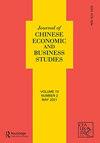Carbon neutrality and socio-economic development
IF 3.7
Q2 ECONOMICS
Journal of Chinese Economic and Business Studies
Pub Date : 2023-01-02
DOI:10.1080/14765284.2023.2182013
引用次数: 1
Abstract
To achieve the 1.5°C goal, the world needs to reach carbon neutrality by the mid-century. The achievement of carbon neutrality not only relates to climate change mitigation, but also delivers unprecedented and tremendous changes to society in green economic growth, responsible consumer behaviours, human well-being, and health. This special issue originated from the China-UK Workshop on Climate Change Economics held by Center for Energy and Environmental Policy Research, Beijing Institute of Technology and Bartlett School of Sustainable Construction, University College London. This special issue serves as a platform for the researchers to have a discussion on the balance between socioeconomic targets and actions for decarbonization strategies. The papers in this SI cover topics on decarbonization of economic growth, transition in energy system, firms’ commitment to carbon neutrality, and the trends of carbon neutrality-related research in recent decades. China’s commitment to carbon neutrality is critical to the global efforts in climate change mitigation since it has been the world’s largest emitter since 2006. The achievement of carbon neutrality in China should be based on a thorough transition of the economic growth mode in the process of industrialisation and urbanisation. The old approaches of heavy investments in physical infrastructure, with a focus on manufacturing, high-carbon infrastructure and fossil fuel, need to be abandoned. By linking the 14 Five-Year Plan and carbon neutrality goal, Stern and Xie (2023) proposed a new growth story for China to shift from overexploitation of natural resources and the chase for material wealth to a multidimensional conception of human well-being, protection of natural resources, boost of sustainable technologies, and changes in consumer behaviour. Investment in sustainable growth and low-carbon innovations is vital to promote the structural transformation of industries. In achieving the carbon neutrality goal, energy transition is one of the most important approaches. By establishing an evaluation indicator system, Li et al. (2023) assessed the progress in the energy production revolution during 2015–2019 in China. Results indicate that the production revolution in the supply-side management of energy and clean development and the efficient utilization of coal are the most prominent aspects of revolution advancements. A slowdown of the energy production revolution in 2018 and 2019 is also shown. China’s energy system is facing some challenges, including insufficient technology innovation, weak consumption and storage capacity for clean energy, sluggish construction of the energy product standard system and transaction management system, the brittle cross-regional transmission of energy, and the backward construction of an energy production intelligent system. R&D investment in clean power generation technology, the establishment of intelligent energy production, supply, storage and marketing systems, and the improvement JOURNAL OF CHINESE ECONOMIC AND BUSINESS STUDIES 2023, VOL. 21, NO. 1, 1–3 https://doi.org/10.1080/14765284.2023.2182013碳中和与社会经济发展
为了实现1.5°C的目标,世界需要在本世纪中叶达到碳中和。实现碳中和不仅关系到减缓气候变化,而且还在绿色经济增长、负责任的消费者行为、人类福祉和健康方面给社会带来前所未有的巨大变化。本期特刊源于北京理工大学能源与环境政策研究中心与伦敦大学学院巴特利特可持续建设学院联合举办的中英气候变化经济学研讨会。这期特刊为研究人员提供了一个讨论社会经济目标与脱碳战略行动之间平衡的平台。本SI的论文涵盖了经济增长的脱碳、能源系统的转型、企业对碳中和的承诺以及近几十年来碳中和相关研究的趋势。自2006年以来,中国一直是全球最大的碳排放国,因此中国对碳中和的承诺对全球减缓气候变化的努力至关重要。中国要实现碳中和,必须在工业化和城市化进程中彻底转变经济增长方式。必须放弃对有形基础设施进行大量投资的旧方法,重点放在制造业、高碳基础设施和化石燃料上。通过将“十四五”规划与碳中和目标联系起来,Stern和Xie(2023)提出了中国从过度开采自然资源和追求物质财富向多维度人类福祉、保护自然资源、促进可持续技术和改变消费者行为转变的新增长故事。投资可持续增长和低碳创新对促进产业结构转型至关重要。能源转型是实现碳中和目标的重要途径之一。Li et al.(2023)通过建立评价指标体系,评估了2015-2019年中国能源生产革命的进展情况。结果表明,能源供给侧管理的生产革命和清洁发展以及煤炭的高效利用是革命进展的最突出方面。报告还显示,2018年和2019年能源生产革命放缓。中国能源系统面临着技术创新不足、清洁能源消纳和储存能力薄弱、能源产品标准体系和交易管理体系建设滞后、能源跨区域传输脆弱、能源生产智能化系统建设滞后等挑战。清洁发电技术的研发投入,智能能源生产、供应、储存和销售系统的建立,以及改进《中国经济与商业研究》2023年第21卷第1期1,1 - 3 https://doi.org/10.1080/14765284.2023.2182013
本文章由计算机程序翻译,如有差异,请以英文原文为准。
求助全文
约1分钟内获得全文
求助全文

 求助内容:
求助内容: 应助结果提醒方式:
应助结果提醒方式:


